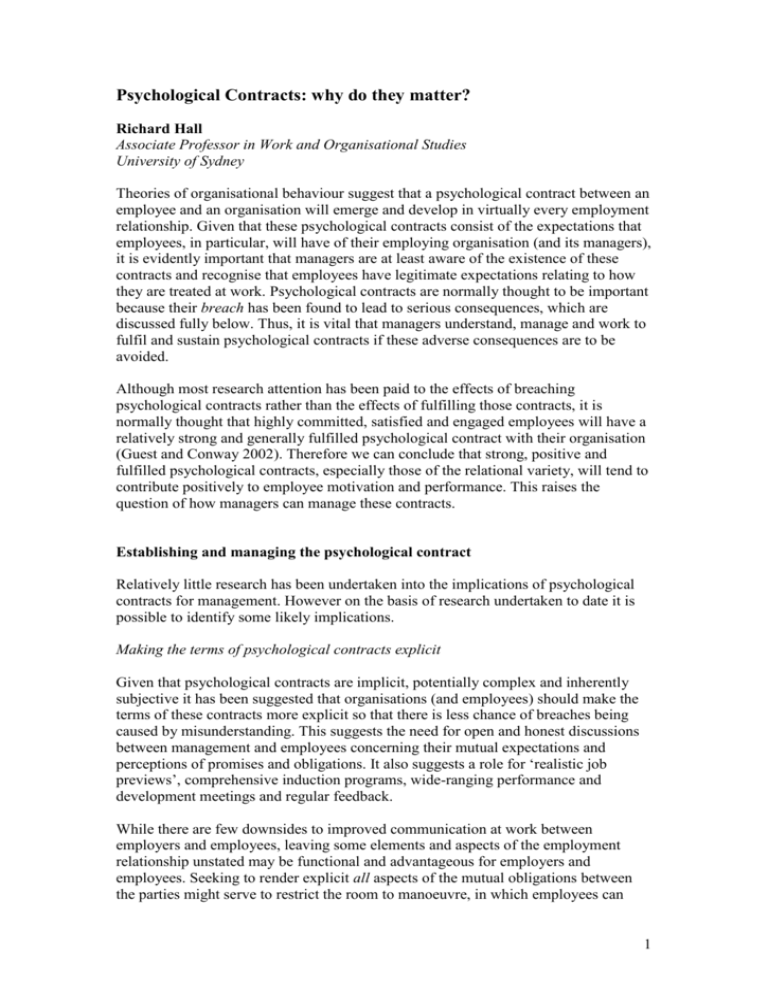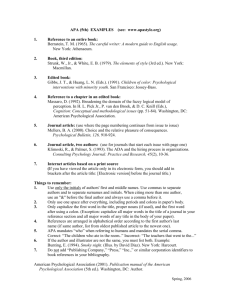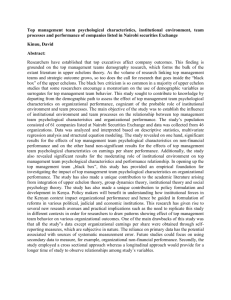
Psychological Contracts: why do they matter?
Richard Hall
Associate Professor in Work and Organisational Studies
University of Sydney
Theories of organisational behaviour suggest that a psychological contract between an
employee and an organisation will emerge and develop in virtually every employment
relationship. Given that these psychological contracts consist of the expectations that
employees, in particular, will have of their employing organisation (and its managers),
it is evidently important that managers are at least aware of the existence of these
contracts and recognise that employees have legitimate expectations relating to how
they are treated at work. Psychological contracts are normally thought to be important
because their breach has been found to lead to serious consequences, which are
discussed fully below. Thus, it is vital that managers understand, manage and work to
fulfil and sustain psychological contracts if these adverse consequences are to be
avoided.
Although most research attention has been paid to the effects of breaching
psychological contracts rather than the effects of fulfilling those contracts, it is
normally thought that highly committed, satisfied and engaged employees will have a
relatively strong and generally fulfilled psychological contract with their organisation
(Guest and Conway 2002). Therefore we can conclude that strong, positive and
fulfilled psychological contracts, especially those of the relational variety, will tend to
contribute positively to employee motivation and performance. This raises the
question of how managers can manage these contracts.
Establishing and managing the psychological contract
Relatively little research has been undertaken into the implications of psychological
contracts for management. However on the basis of research undertaken to date it is
possible to identify some likely implications.
Making the terms of psychological contracts explicit
Given that psychological contracts are implicit, potentially complex and inherently
subjective it has been suggested that organisations (and employees) should make the
terms of these contracts more explicit so that there is less chance of breaches being
caused by misunderstanding. This suggests the need for open and honest discussions
between management and employees concerning their mutual expectations and
perceptions of promises and obligations. It also suggests a role for ‘realistic job
previews’, comprehensive induction programs, wide-ranging performance and
development meetings and regular feedback.
While there are few downsides to improved communication at work between
employers and employees, leaving some elements and aspects of the employment
relationship unstated may be functional and advantageous for employers and
employees. Seeking to render explicit all aspects of the mutual obligations between
the parties might serve to restrict the room to manoeuvre, in which employees can
1
exercise discretion and autonomy, and in which managers and supervisors can tolerate
and accommodate the inevitable diversity of employee needs and preferences. The
reality probably is that in instances where implicit rules are rendered explicit, the
superior power and authority of management will typically result in the assertion of
managerial prerogative over employee aspirations.
Managing changes to the psychological contract
Organisations (and their managers) need to recognise that organisational changes will
often imply changes to the psychological contract even if they don’t involve changes
to the formal employment contract and working conditions of employees. This
underlines the importance of organisations, change agents and managers recognising
the need for effective strategies for anticipating, recognising and managing employee
resistance and accommodating the expectations that employees might have. Common
strategies for managing employee resistance to change centre on the following
(Brown and Harvey 2006):
-
Education and communication concerning the need for change
Creating and reinforcing the vision of where the organisation is headed
Ensuring participation and involvement of those affected in the change process
Facilitating and supporting change through training and resources
Negotiating with resistors
Use of reward systems to encourage changed behaviours
Use of explicit or implicit coercion
Research into resistance to organisational change suggests that managers need to
understand the reasons for resistance in order to manage it. The psychological
contracts perspective highlights that the reason for resistance might be associated with
a perceived breach to the psychological contract. Communication, participation,
negotiation and reward strategies might therefore need to be geared to addressing
those perceived breaches.
Breaching the psychological contract - implications for managers and
organisations
While the place of psychological contracts in models of employee motivation and
performance (which are the mainstay of the discipline of organisational behaviour) is
controversial, the best conclusion is that they probably affect individual employee
attitudes and behaviour (see Figure 1). Psychological contract breach is generally
defined as a perceived discrepancy between the promise and performance (of the
organisation) with respect to one or more terms of the contract. In other words,
according to the employee, the organisation ‘fails to meet its side of the deal’.
The weight of research indicates that instances of psychological contract breach tends
to affect both employee attitudes and behaviours, although the effect is significantly
more pronounced on attitudes than behaviours. In particular, breaches in the
psychological contract have been found to be associated with the following attitudes:
lower levels of job satisfaction;
2
lower levels of organisational commitment; and
a greater intention to quit.
Breaches have also been associated with several dimensions of adverse employee
behaviour:
higher quit rates;
less propensity to display organisational citizenship behaviour (‘going the
extra mile’ at work); and
lower in-role job performance.
Figure 1: Simplified Model of the Role of the Psychological Contract and
Attitudes and Behaviour
Individual
Characteristics
Organisational
Characteristics,
Policies and
Practices
Attitudes
- Motivation
- Satisfaction
-Commitment
-intention to
quit/ stay
Behaviour
- job
performance
- OCB
- quitting
Results
Psychological Contract
Breaches
Evidently, breaches of the psychological contract can have serious consequences for
employees and, to the extent that organisations might be concerned about retention,
performance and productivity, for organisations as well.
Surveys of employee experiences suggest that breaches are not uncommon. One study
of recent MBA graduates indicated that 55% reported at least one breach of the
psychological contract in their first two years of employment (Robinson and
Rousseau 1994 in Conway and Briner 2005: 65). Methodologies based on employees’
diaries of workplace experience report significantly higher levels of breach – one
study reported that 69% of employees recorded at least one breach in the ten-day
survey period (Conway and Briner 2002 in Conway and Briner 2005: 65). Of course,
not all breaches result in adverse attitudinal or behavioural responses. The implication
of any given breach is likely to be related to the importance of the unmet promise or
obligation, the extent to which the breach is actually attributed to the organisation,
3
and the depth and strength of the existing psychological contract (especially the
relational contract).
The causes of psychological contract breach are also largely a matter of informed
speculation in the absence of a substantial body of systematic research. Conway and
Briner (2005: 65-69) contend that breaches will be caused by:
Management reneging on deals. Here, organisations, acting through the
agency of managers, might simply change the terms of the deal, unilaterally.
Indeed, many instances of organisational change might involve a change to
the psychological contract. For example, organisational restructuring has often
been associated with downsizing which may have implications for promises
regarding job security. This kind of change has been comprehended as a shift
from a relational psychological contract to a transitional psychological
contract (Shields 2007).
Inadequate human resource policies. This is likely to occur where HR policy
and practice does not match HR rhetoric. The organisation’s espoused values
and advertised HR policies might advocate human resource development,
training opportunities, family-friendly work arrangements, career
development and promotional opportunities, however actual work practices
and the operation of performance management systems might result in
escalating performance demands, resource constraints and work
intensification.
Lack of perceived organisational or supervisor support for the employee.
While employees are thought to have their psychological contract with the
organisation, they will inevitably regard their supervisor or manager as
responsible for upholding the deal on a regular basis. The failure of managers
to provide adequate resources, feedback, support or opportunities for
employees may be caused by inadequate resources at their disposal,
managerial incompetence, role misperceptions, or a misunderstanding of the
expectations of the employee.
Misunderstanding of the terms of the psychological contract. Research has
repeatedly shown that employees and managers often have different
perceptions as to the content of psychological contracts, particularly with
respect to the obligations owed by the organisation. If the employee has overestimated the promises made by the organisation, then a perceived breach is
likely even where the organisation believes it is fulfilling its side of the deal.
Conway and Briner (2005) also argue that a specific action by an organisation or
management will be more likely to be perceived as a breach of the psychological
contract where the employee has previously experienced breaches, and where the
employee has relatively good options in the labour market for alternative
employment. Obviously, this last point suggests that breaches will have greater
implications where labour market conditions are relatively tight and where the skills
of focal employees are in short supply.
4
Managing breaches to the psychological contract
If managers can recognise that the psychological contract has been breached, from the
perspective of an employee, what can they do?
Organisations and managers should monitor for breaches. It is likely that many
employees will be able to tolerate breaches up to some ‘tipping point’ at which a
further breach will lead to adverse attitudes and behaviour. Managers therefore might
be able to monitor for breaches so that preventative action might be taken to avert the
adverse consequences of breaches. Conway and Briner (2005) argue that managers
need to be alert to the displayed emotions and behaviours of their employees for signs
of perceived psychological contract breach. They identify frustration, helplessness,
anger and resentment as key displayed emotions that should send warning signals.
Ultimately the capacity of managers to read and interpret these signals will probably
related to their ‘emotional intelligence’ (Goleman 1998).
Organisations and managers can try to redress breaches. Once a breach has occurred
managers can try to redress the situation by: a) explaining the reasons for the breach;
b) compensating for the breach; and/or c) ensuring organisational justice (Conway
and Briner 2005). Evidence for the effectiveness of these strategies is mixed:
explanation appears to make little difference to employees’ ascription of
responsibility to the organisation (Robinson and Morrison 2000); adequate
compensation can apparently ameliorate the damage done by a breach (Conway and
Briner 2005: 173) ; and, organisational justice strategies need to be tailored to the
specifics of the breach to have any effect (Kickul et al 2002).
Are psychological contracts just a managerialist confidence trick?
The concept of the psychological contract directs attention to the individual level by
focussing on the employee’s formation of a set of expectations of employer behaviour
at work. It suggests a scenario where employees then evaluate organisational
behaviour according to the fulfilment or breach of the terms of the implied contract
and predicts that employees will take adverse action against an organisation where
serious breaches occur. It also implies (however imperfectly) that there is something
approximating an equivalence between the two contacting parties: the employee and
the organisation coming together to reach an implicit agreement as to the terms under
which each will fulfil their obligations. Much of the discussion about psychological
contracts also suggests that breaches are often caused by employee’s
misunderstanding the actual terms of the contract, hence the suggestion that
management should clarify the terms of psychological contracts by making them
more explicit.
Some critics (eg: Cullinane and Dundon 2006) have argued that this is a somewhat
fanciful depiction of the contemporary workplace and that the concept of the
psychological contract simply serves to disguise and obscure the true nature of
management power and prerogative at work. Rather than an equivalence between
employee and employer at work, these critics see a structural antagonism between
employers and employees where the former use their superior power to dictate the
explicit and implicit terms and conditions of employment, both formally and
5
informally. They reject the notion that employees aggrieved by a perceived breach to
the psychological contract can simply elect to quit, or otherwise discipline the
organisation through reduced effort and performance. More often than not, they
contend, employees are forced to accept the new terms of the psychological contract
as dictated by management. Further they suggest that organisations routinely and
deliberately breach psychological contracts because they are more committed to
achieving the strategic goals of the business than honouring any implicit contract that
employees might believe they have with them. The case studies noted by Cullinane
and Dundon (2006), for example, certainly demonstrate that breaches are often caused
by deliberate management strategies associated with downsizing, restructuring, reengineering and cost-cutting rather than by employee misinterpretation of the terms of
the psychological contract. It is also difficult to avoid the conclusion that, despite the
rhetoric of ‘high-performance’ and ‘high-involvement’ work systems that should be
associated with longer-term, relational or balanced psychological contracts, the
predominant pattern in western business organisations over the past 20 years has been
a shift in the direction of a greater emphasis on shorter-term, transactional and
transitional psychological contracts.
Conclusion
Ultimately, the rhetoric surrounding the current interest in psychological contracts
needs to be critically considered in light of the realities of workplace change in the
recent past. When managers speak of the need to manage the psychological contract,
as many apparently now do, we need to ask whether they actually mean managing
down the expectations of employees and socialising them into accepting the ‘realities’
of deals that are rather more transactional, short-term and unilateral than relational,
long-term and based on partnership. Nevertheless, if nothing else, the concept of the
psychological contract does remind us that the perceived terms and conditions under
which people work in organisations are considerably more extensive, complex and
subtle than suggested by the formal contract of employment, and that their breach can
have significant consequences for both individuals and organisations.
Websites and Resources
CIPD Factsheet: The psychological contract. (January 2008). This brief overview
of psychological contracts provided by the UK Chartered Institute of Personnel
and Development is useful and can be accessed at
http://www.cipd.co.uk/subjects/empreltns/psycntrct
Grimmer, M. and Oddy, M. (2007) ‘Violation of the Psychological Contract: The
Mediating Effect of Relational Versus Transactional Beliefs’, Australian Journal
of Management, 32(1): 2007. This recent paper presents data based on a study of
Australian MBA students from two Australian universities. It can be downloaded
from:
http://www.agsm.edu.au/eajm/0706/pdf/Paper8_Grimmer_Oddy_June2007.pdf
Baird, M. ‘Three Degrees of Contract’ looks at the legal contract, the
psychological contract and the social contract and considers the relationships
between them in understanding relations at work. It can be accessed at:
http://www.econ.usyd.edu.au/wos/worksite/baird7.html
6
For an example of the use of the psychological contract by a private management
consultancy and development organisation see: Adelphi Associates (UK):
http://www.adelphi-associates.co.uk/html/psychological_contract.html
References
Brown, D. and Harvey, D. (2006) An Experiential Approach to Organization
Development. 7th Edition. New Jersey: Pearson Prentice Hall.
Conway, Neil & Briner, Rob B. (2005) Understanding Psychological Contracts at
Work: A Critical Evaluation of Theory and Research. Oxford: Oxford University
Press.
Cullinane, N. and Dundon, T. (2006) ‘The Psychological Contract: A critical review’
International Journal of Management Reviews 8 (2): 113-129.
Goleman, D. (1998) ‘What makes a leader?’ Harvard Business Review, Nov-Dec: 93102.
Guest, D. and Conway, N. (2002) Pressure at work and the psychological contract.
London: CIPD.
Kickul, J., Lester, S. and Finkl, J. (2002) ‘Promise Breacking during Radical
Organizational Change: Do Justice Interventions Make a Difference?’ Journal of
Organizational Behavior, 23: 469-88.
Robinson, R.L. and Morrison, E.W. (2000) ‘Psychological Contracts and OCB: The
Effect of Unfulfilled Obligations on Civic Virtue Behavior’ Journal of Organizational
Behavior, 16: 289-298.
Shields, J. (2007) Managing Employee Performance and Reward. Cambridge:
Cambridge University Press
7






